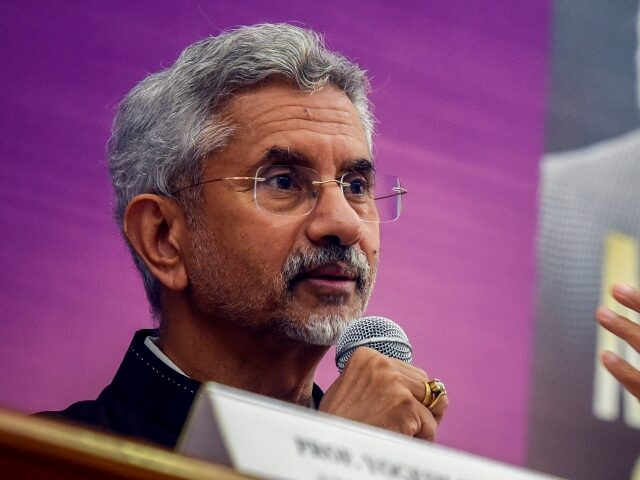India’s External Affairs Minister S. Jaishankar, the nation’s top diplomat, excoriated European countries doing business with Russia in an interview on Monday, asking why pro-Ukraine nations on the continent continued to purchase Russian fossil fuels after Moscow escalated its war with the country in February.
Jaishankar made the remarks in an interview on ZIB2, a show on ORF, Austria’s national public broadcaster, during a visit to the country culminating this week. The top diplomat has repeatedly expressed frustration with western European states condemning India’s close economic ties to Russia. India has greatly increased its imports of Russian gas and coal as prices for the commodities collapsed as a result of sanctions in response to Russia’s full-scale invasion of Ukraine beginning in February.
India exponentially increased its imports of Russian coal through much of 2022 and made Russia its top oil supplier by November. Reports from June indicated that Russia was offering India as much as 30 percent discounted fossil fuels, encouraging bigger purchases.
“We ended the financial year 2022, the purchases of Russian oil were not two percent, it was 0.2 percent,” Indian Oil Minister Hardeep Singh Puri said in November. “Moreover, we still buy a quarter of what Europe buys in one afternoon. So let’s be very clear about what the perspective is.”
India is formally neutral in the Ukraine invasion and repeatedly calls for dialogue between the two states, without condemning Russia for initially invading.
Responding to a question on European pressure for India to cut its Russian imports, Jaishankar observed, according to the Indian outlet World Is One News (WION), “Europe imported, in the same period, six times the energy which India did.”
“If it is a matter of principle why didn’t Europe cut on the first day?” he asked. “Why didn’t on 25th February, a complete cut off of energy imports from Russia? You can’t say it’s my principle but by the way, I will do it by my timing.”
Jaishankar also objected that poverty levels in India are far higher than those in Europe, so the Indian government has a heightened need for discounted fuel and other deals.
“If 60,000 euros or whatever your per capita income is, if you are so caring about your population, I have a population at $2,000 which also needs energy,” he said. “The price of oil has doubled and Europe also moving into the Middle East and diverting their production into Europe and raising prices … putting pressure on global oil markets and on my imports as well.”
Elsewhere in the conversation, Jaishankar accused Europe of being disproportionately concerned about Ukraine while being lukewarm or apathetic to other instances in which a country experienced a violation of sovereignty.
“I can give you many instances of countries violating the sovereignty of another country,” Jaishankar said, “If I were to ask where Europe stood on a lot of those, I am afraid, I’ll get a long silence.”
"I can give you many instances of countries violating the sovereignty of another country, If I wr to ask wr Europe stood on lot of those, I am afraid, I'll get a long silence", EAM Jaishankar to Austrian state broadcaster ORF.
Ctsy: Austria's ORF pic.twitter.com/R2Q13L8hUx
— Sidhant Sibal (@sidhant) January 3, 2023
Jaishankar did not mention any examples of such violations of sovereignty, though India routinely accuses two of its neighbors, Pakistan and China, of invading its territory. With Pakistan, India’s top geopolitical rival, New Delhi maintains territorial disputes in Kashmir, while India has experienced multiple military engagements against China since 2020 on their mutual Himalayan border.
Indian officials have complained of Western support for Pakistan in the past in response to calls to stop importing Russian fossil fuels.
“We have, as you know, a substantial inventory of Soviet and Russian-origin weapons, and that inventory actually grew for a variety of reasons – you know, the merits of the weapon systems themselves,” Jaishankar said during a press briefing in October, “but also because for multiple decades, Western countries did not supply weapons to India, and in fact saw a military dictatorship next to us [Pakistan] as the preferred partner.”
Russia invaded Ukraine in 2014, colonizing its Crimean peninsula and fueling a war in the eastern Donbass region of Ukraine for eight years. Last year, Russian leader Vladimir Putin announced a “special operation” that would result in an overt Russian military invasion of Ukraine deep into the heart of the country, allegedly to oust democratically elected President Volodymyr Zelensky and his “Nazi” regime. Zelensky, who is Jewish, has expressed outrage at being labeled a Nazi and vowed to continue his country’s war with Russia – with European and American military aid – until no Russian presence remains in Ukrainian territory. Zelensky outlawed any peace talks with Putin in October, decreeing that Ukraine would only negotiate with a different Russian president.
Germany, France, the United Kingdom, and other major NATO powers imposed some sanctions on Russia in the aftermath of the “special operation” but still heavily rely on Russia for natural gas and other critical imports. The topic of European NATO members being too reliant on Russia was a point of strong contention under American President Donald Trump, who in 2018 called Germany “captive to Russia” and urged more self-reliance.
“It is very sad when Germany makes a massive oil and gas deal with Russia, where we’re supposed to be guarding against Russia, and Germany goes and pays out billions and billions of dollars a year to Russia,” an incensed Trump said at the time. “We’re protecting Germany, we’re protecting France, we’re protecting all of these countries.”

COMMENTS
Please let us know if you're having issues with commenting.